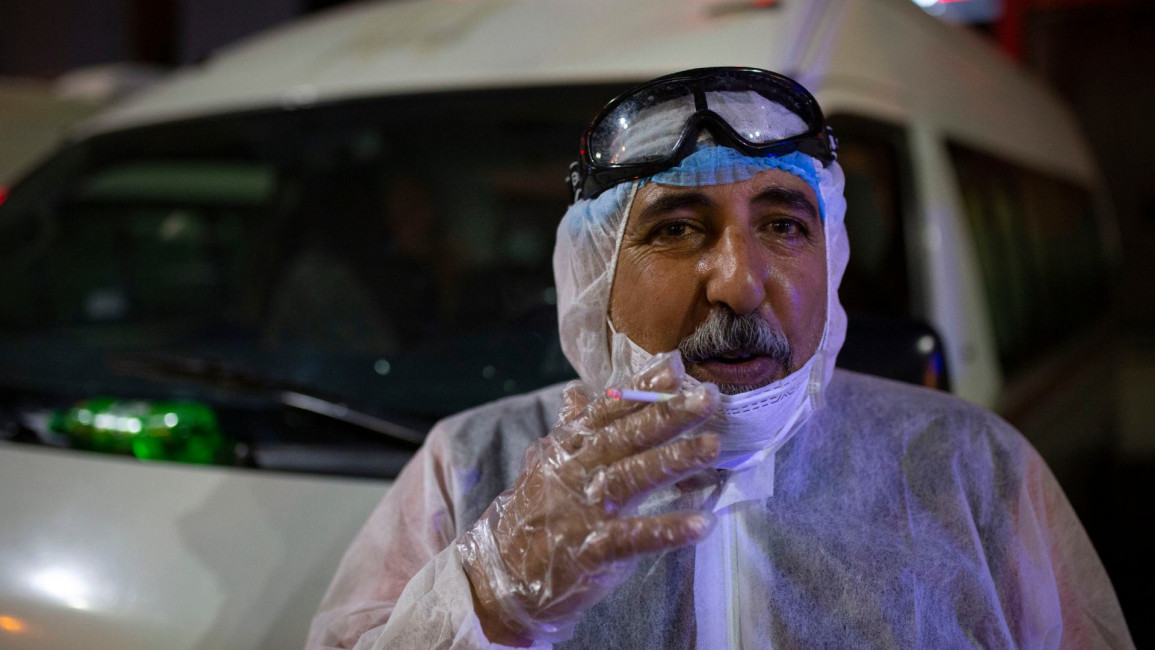Iraqi doctors share contact details on social media for free coronavirus consultations
Iraqi doctors share contact details on social media for free coronavirus consultations
Iraqi doctors are going above and beyond to provide medical assistance to those suffering with coronavirus symptoms.
3 min read
Many suspect Iraq's coronavirus numbers to be much higher than reported [AFP/Getty]
Iraq's doctors are providing free consultations in person and over social media to Iraqi citizens desperate for sincere medical advice amid a strict government curfew to contain the novel coronavirus.
"Every day I receive a large number of messages and calls from citizens," Masoudi said.
He added that, in many cases, those with coronavirus symptoms are seeking clear advice on whether or not to go to the hospital.
Many providing voluntary consultations see it as their "human and national duty", doctor Muhammad al-Zubaidi told The New Arab.
Al-Zubaidi said his specialisation is not as central to fighting the coronavirus pandemic as that of other doctors. But he said: "I have the basic equipment to carry out the initial checks, and I can diagnose some health conditions, at least for the residents near my neighbourhood."
Al-Zubaidi told The New Arab he walks or rides his bicycle to attend to patients.
"Since the curfew was imposed, I have been keen to provide these services. Some people are old and cannot come to my home. Some people call me from other neighbourhoods, but I respond to their calls whatever the circumstances," he said.
Iraq has reported 65 deaths and over 1,100 cases of coronavirus but many suspect the real numbers to be much higher, as only a few thousand people from a population of 40 million have been tested.
The phone numbers of doctors who have volunteered to provide free consultations have spread like wildfire on social media.
The doctors can be contacted at any time for advice, Ali Talib Al-Masoudi, a doctor who specialises in internal diseases, told The New Arab's Arabic-language service.
"It began with individual initiatives and spread on social media," he said, adding that he and a group of doctors have shared their phone numbers, names and specialisms on social media in the hope of becoming accessible to anyone needing assistance.
The doctors can be contacted at any time for advice, Ali Talib Al-Masoudi, a doctor who specialises in internal diseases, told The New Arab's Arabic-language service.
"It began with individual initiatives and spread on social media," he said, adding that he and a group of doctors have shared their phone numbers, names and specialisms on social media in the hope of becoming accessible to anyone needing assistance.
"Every day I receive a large number of messages and calls from citizens," Masoudi said.
He added that, in many cases, those with coronavirus symptoms are seeking clear advice on whether or not to go to the hospital.
Many providing voluntary consultations see it as their "human and national duty", doctor Muhammad al-Zubaidi told The New Arab.
"Every profession has a fundamental role in society. But at certain times, some professions are more important than others. This is the case of all medical personnel today," he said.
|
"Since the curfew was imposed, I have been keen to provide these services. Some people are old and cannot come to my home. Some people call me from other neighbourhoods, but I respond to their calls whatever the circumstances," he said.
Paediatrician Nour al-Rubaie told The New Arab she has received dozens of phone calls and messages via WhatsApp after volunteering to give free medical consultations on social media.
She said that although she lives in the Al-Mansour neighbourhood, west of the capital Baghdad, she receives calls from people in distant neighbourhoods.
She said that although she lives in the Al-Mansour neighbourhood, west of the capital Baghdad, she receives calls from people in distant neighbourhoods.
"I see it as my duty to help them in this crisis," she said. Rubaie talks to many mothers about the condition of their children, prescribing medications or advising they take them to the hospital.
"In addition to my work at the health centre, this volunteer work takes up several hours. I sleep about five hours a day."
"In addition to my work at the health centre, this volunteer work takes up several hours. I sleep about five hours a day."
Iraqis are endearingly referring to doctors as "fighters", "soldiers" and "heroes" for their role in combatting the coronavirus outbreak.
Nama Abdul Razzaq, 32, a relief activist, told The New Arab that dozens of doctors have contacted civil organizations and volunteered their services.
Read more: Iraqi volunteers help needy families during virus crisis
"The nicknames that citizens give to doctors and medical personnel, such as heroes and fighters, expresses how dedicated they are to serving the people during this critical period," she said.
Nama Abdul Razzaq, 32, a relief activist, told The New Arab that dozens of doctors have contacted civil organizations and volunteered their services.
Read more: Iraqi volunteers help needy families during virus crisis
"The nicknames that citizens give to doctors and medical personnel, such as heroes and fighters, expresses how dedicated they are to serving the people during this critical period," she said.
Iraq has reported 65 deaths and over 1,100 cases of coronavirus but many suspect the real numbers to be much higher, as only a few thousand people from a population of 40 million have been tested.
In a bid to stop the spread of the novel coronavirus pandemic, authorities have imposed a countrywide lockdown, ordering schools and most shops shut.
While the government is still paying salaries and pensions to millions, Iraq's modest private-sector economy has come to a grinding halt overnight.
 |
Agencies contributed to this report.
Follow us on Facebook, Twitter and Instagram to stay connected



